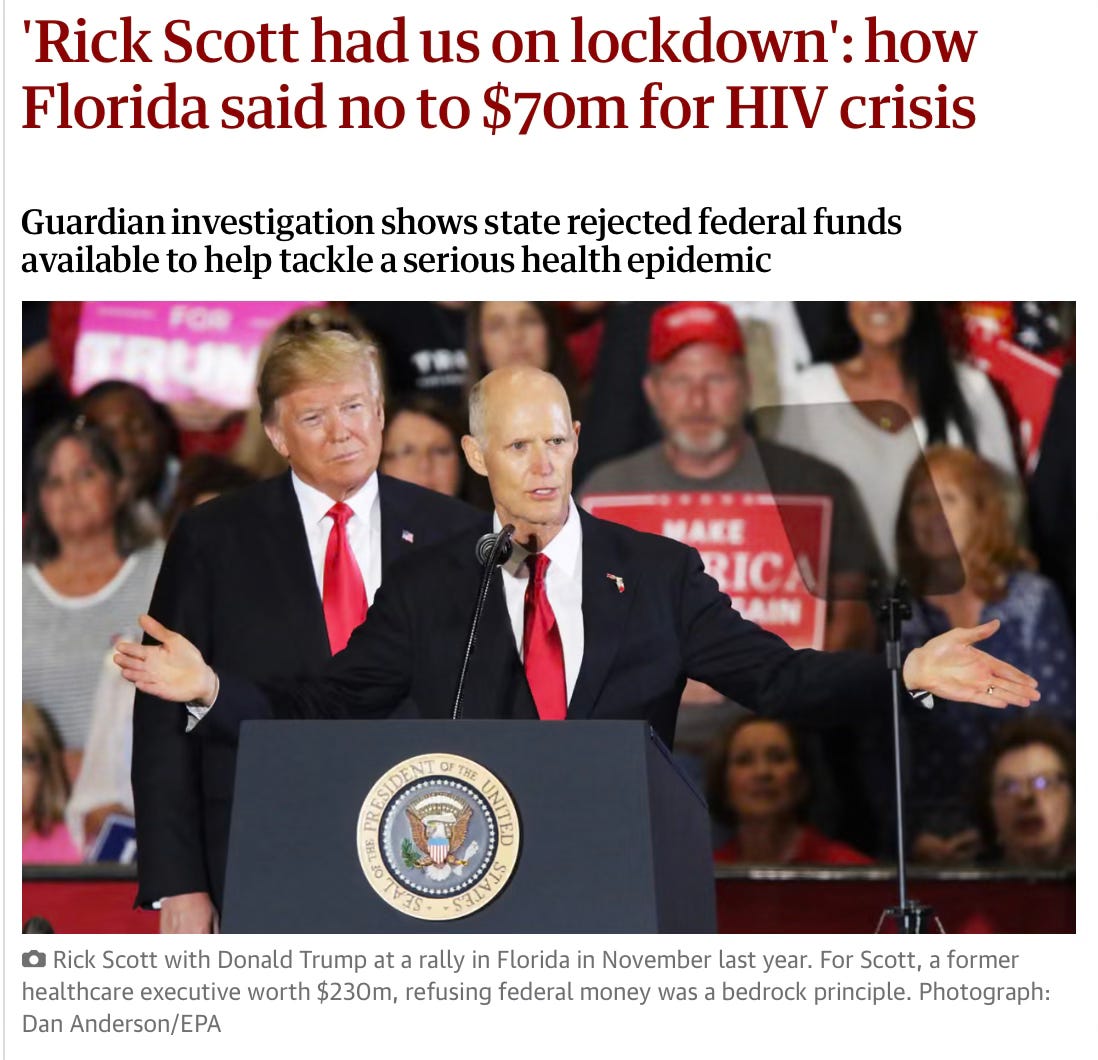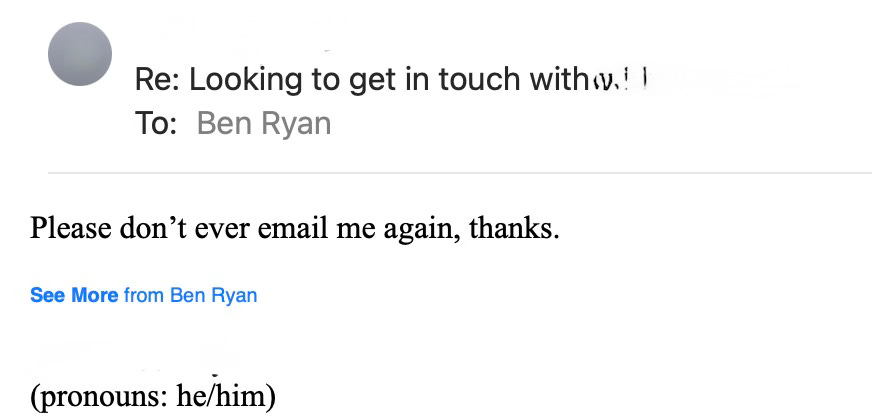How Cancel Culture Is Still Coming For Me
And how activists will eagerly cut off their noses to spite their faces in service of virtue signaling and maintaining an image of ideological purity amid the battle over pediatric gender medicine.
Some people think that in this supposedly post-woke era, cancel culture, at least from the left, has come to a close.
Think again.
This week, I was on a well-attended public Zoom call run by an HIV advocacy group that provided details about coordinated efforts to combat the Trump administration’s sweeping cancelation of HIV research grants. As participants were signing onto the Zoom, one of the people set to present, a prominent, long-time HIV activist, declared that he refused to participate if I was on the call.
It went without saying that this activist, with whom I once maintained an amicable working relationship, was seeking to get me booted from the Zoom because of my reporting on pediatric gender medicine.
In part given that HIV rates are highest among gay men and transgender women, there is considerable overlap between HIV activism and trans activism. And even before the AIDS crisis, gay and trans activism were interlinked, although sometimes at odds.
I have been covering HIV as a reporter for almost a quarter century, and as a teenager in 1995, first began what would become six years of intensive volunteer work in the field. From 2012 to 2020, I served as the science reporter for POZ magazine, covering HIV research intensively. Today, I am one of only a tiny handful of journalists who maintains a speciality in the subject and who routinely publishes reporting about HIV in mainstream outlets. It’s a tough subject to get people to care about, but I keep at it.
In April 2023, trans activist and Harvard Law School clinical instructor Alejandra Caraballo posted a mega-viral tweet in which she falsely claimed that I was writing a “transphobic hit piece” about trans kids.
chronicled l’affaire Caraballo at the time:Within weeks, despite all of my experience in the HIV field and lifelong commitment to battling that epidemic, HIV activists launched a determined effort to blacklist me and the stonewall my efforts to cover the virus.
The campaign clearly continues to this day.
On this week’s Zoom call, the moderator calmly replied to the blacklisting HIV activist that he couldn’t kick anyone off the call (there were about 85 participants at that moment). He simply proceeded with his moderation of the discussion. I was actually surprised I was permitted to remain, because the moderator, himself a longtime HIV activist, ejected me from his HIV-advocacy listserv a number of months ago. (It’s possible he would’ve gladly kicked me off, but he lacked the technical capacity to throw anyone off the Zoom. And I could’ve just signed back on incognito.)
Consequently, the activist who wanted me gone stuck to his word and refused to present on the call. A colleague of his presented in his place, proclaiming that the activist had made an “ethical” stand not to participate.
I told everyone via the chat on the Zoom that I stood by my reporting on pediatric gender medicine. Which I do. I am proud of being one of the few reporters who have the gumption to face the inevitable, fierce blowback and to cover this subject without kowtowing to the bullying pressures of GLAAD and also without employing the vicious and demeaning rhetoric of the far right or the TERF-Island, gender-critical set. No, I will not bend to the demands of the pronoun police!
Why I Use Trans People’s Preferred Pronouns
Transgender civil rights are engulfed in a war of words—and a war over words.
The irony of this effort to compromise my access to information about the efforts to combat the Trump administration’s attacks on scientific researchers is that last month I published a major feature article with NBC News about the very subject of the Zoom call. The piece was pointedly critical of the White House and could not have been more sympathetic to HIV activists’ cause. In the article, I examined the impacts of the administration’s cancelation of gay- and transgender-related research more broadly. And I am currently working on a follow-up piece that will focus more narrowly on HIV-related research grant cancelations.
If these blacklist-happy activists had their way, I would never publish such reporting. As a result, the public would be less knowledgeable about the fact that research into gay, transgender and HIV-related matters is collapsing beneath the brute force of the Trump administration. Other reporters would not be influenced by my work and write similar articles.
Trump’s Assault On Aid for HIV Abroad
I remember how the pride glowed across the health minister’s face when she heralded the “great news from the Kingdom of Swaziland.”
All this is to say is that cancel culture is alive and well in my world. And the activists who seek to cancel me, who attempt to thwart my reporting efforts and to punish me for covering pediatric gender medicine as a scientific subject and not merely a civil rights issue, will gladly cut off their noses to spite their faces.
Some of the HIV-activist campaign against me predates my reporting on gender medicine. Jason Rosenberg, a longtime HIV activist and a baroquely aggressive, queers-for-Palestine agitator, seemed to think I was the bee’s knees during the first half of the summer of monkeypox in 2022, when I was out front covering that outbreak even as I battled cancer and underwent chemotherapy. But then I published an editorial in The Washington Post in which I gladly touched the third rail of gay activism: I advised gay men to change their sexual behavior to mitigate their risk of infection. Mr. Rosenberg and his pals went berserk. One of them kept DM’ing me to call me a TERF. (My poor therapist, when I told him about this, was compelled to interject, “What is a TERF??”) Mr. Rosenberg, who maintains a substantial social-media platform, began a concerted campaign to blacken my name and prevent LGBTQ activists from engaging with me.
An academic infectious disease physician in the Midwest became so enraged when I wouldn’t agree with him in an exchange on Twitter that the word “risk” was stigmatizing and therefore should be avoided that he began campaigning against me online and, I presume, has convinced his pals in his field to stop speaking to me.
Further back, when I was writing for POZ, HIV activists sought to at least get me in hot water with my editors, if not get me fired, when I would refuse to parrot claims of theirs that I knew were not supported by science. In 2018, I insisted, both in public and through private communications, that there was no evidence to support a new activist campaign claiming that the high list price of the HIV prevention pill, Truvada, was the primary cause of poor uptake of the drug. After these activists published a white paper on the subject that was littered with errors, I emailed the authors to point out all the flaws. One of the activists was so incensed that I had undermined his campaign that he published a blog on POZ’s web site trashing me (although he didn’t name me). My editors never even gave me a chance to respond to the piece before they posted it. Instead, ever concerned about keeping the activists on their side, they put a moratorium on my covering the HIV prevention pill and said if I continued to aggravate the activists they would fire me.
That demoralizing experience galvanized me to leave POZ (although financial pressures kept me there for two more years) and to become the type of reporter who was free to ignore activist pressure when warranted and to devote myself to publishing unvarnished truth.
As fierce and widespread as the current blacklisting campaign against me has become, it winds up mostly being an inconvenience. Fortunately, most of my HIV reporting concerns academic research. And as invested in HIV activism as many researchers are, few of them have paid any heed to the campaign against me.
For my recent NBC article on LGBTQ-related grants cancelations, I spoke with one of the leading academics in transgender-related research. He relayed to me with some bemusement that he had been instructed not to speak to me. But instead of blindly heeding that dictum as so many others have, he simply asked me what the deal was with my transgender reporting. I explained to him how important it was to me to cover the subject with the same vein of skepticism and scrutiny that I had always applied to my HIV reporting. He was satisfied with that explanation and we carried on with the interview. Imagine that! Another source for that story, however, cut off communication midstream, presumably after the Cancel Ben Ryan Committee had reached her.
When my reporting requires actual contact with HIV activists, I do still manage to get my work done. But it often takes more time, because I have to cast a much wider net to find willing sources and have to invest energy into convincing reluctant sources to defy the blacklist. Few are willing.
These activist efforts to throw a wrench into my reporting are useless as a means of stopping me from covering pediatric gender medicine as I see fit. Instead, here’s what the activists achieve by blacklisting me: They succeed in virtue signaling to one another. They need to take these stands against me to maintain the sheen of ideological purity in the face of a Manichean, wildly politicized battle over pediatric gender medicine in which they erroneously categorize me as advocating for a far-right cause, or even a turncoat member of the far right itself.
Ms. Caraballo, who champions academic freedom and free speech from her perch at Harvard, was responsible for kickstarting the blacklist against me two years ago. In her viral hate tweet, she issued a call to arms against me and instructed any potential sources of mine to shut me out.
Earlier that year, I was the first reporter to demonstrate how the archconservative activist and commentator Matt Walsh’s attacks on Vanderbilt’s pediatric gender clinic led Tennessee Governor Bill Lee to block $8.3 million in federal funding for HIV surveillance and prevention in the state.
This followed my 2019 investigation for The Guardian in which I uncovered the fact that as governor of Florida, Rick Scott had presided over the effective blocking of $70 million in federal funds for the state’s worsening HIV epidemic.
Within weeks of Ms. Caraballo’s 2023 tweet about me, I was working on a follow-up story about the Tennessee situation when I first confronted the impacts of the blacklist. A few of my sources from the first piece I wrote about Tennessee told me that they’d been informed that I was toxic and not to be trusted due to my approach to the trans-kids issue; they were told not to speak to me anymore. A couple of them chose to disregard this demand, given they already trusted me; plus, my reporting on the issue had helped their cause.
But one of these Tennessee sources held out, determined not to break rank with the fast-forming club of blacklisters. Finally, when she realized that I was the only person who had information about how the legislature was seeking to replace the lost federal HIV funds, as I would ultimately report, she relented and spoke to me so she could learn what I knew. Quid pro quo ruled the day.
Shortly after that, I attended the book launch party of a family friend. Her young-adult child tried to get me thrown out of the event, saying I made her trans friends “unsafe”. I refused to leave.
Later in 2023, I began a months-long reporting effort on a niche issue in the HIV prevention and advocacy world. My article would represent probably the only time activists concerned with this arcane subject would ever receive coverage about their cause in a major national news outlet. But this fact was far less important to these activists than jumping on the Punish Ben Ryan train. Conveniently for them, everyone concerned with this particular subject was already on the same listserv. So, as a mole told me, they used the listserv to coordinate a stonewalling campaign against me. No one in the group was permitted to speak to me.
In addition to the mole, I did find one other member of the group who gave me a detailed interview and was willing to go on the record. He explained that a powerful method for keeping everyone onboard with the blacklist was the fact that if they violated it, they would be expelled from the listserv. This was enlightening insight. It brought to mind how the Maoist Red Guard was so successful at terrorizing academics. Even if individual people quietly disagreed with this government-sanctioned campaign of mass hysteria and suppression of free expression, the cost of objecting was so great, people went along with it out of fear.
(This is not to say that this silly blacklist against me is even 1/1,000th as bad as the Cultural Revolution!)
To wit, at the last minute, my on-the-record source for the niche HIV article got cold feet. In an apparent attempt to save himself in the eyes of the group, he sent the listserv a lengthy email (which the mole quickly relayed to me) in which he heaped scorn upon me and provided exacting detail about everything I’d told him about my draft during our fact-checking call. The joke was on him in the end, though, because he got cut from the article for space reasons. I emailed him to say that the triple-crossing, backstabbing effort on his part was quite unnecessary.
He didn’t reply.
This is typical behavior from this lot.
What’s most remarkable to me about the HIV activists’ blacklisting campaign against me is that not one of them has ever reached out to me to try to convince me to change the way I engage with the subject of pediatric gender medicine or to detail their complaints against me. Passive aggression has been their go-to weapon. Last year, when I emailed the activist who this week refused to participate in the Zoom call, seeking information for an HIV-related article I was writing, he simply replied: “Please don’t ever email me again, thanks.” He didn’t reply to my subsequent emails in which I indicated I understood he was observing the blacklist and asking him to reconsider.
You can call this behavior by the activists illiberal. I tend to see it as puerile. When you are a child and you have very little agency, one of the only levers you can pull to exert any power is to submit your family the silent treatment. As the youngest child of three boys, I was once a master of this domain!
The activists want to punish me and to maintain an image of ideological purity far more than they want their own voices to be heard through my work. Speaking to me means associating with me, and they cannot afford such taint.
This raises the question of whether their priorities out of whack and they are only punishing themselves in the end. I still get my work done. I continue to publish articles about pediatric gender medicine and HIV alike. And the HIV activists forfeit their chance to influence my reporting.
I am an independent journalist, specializing in science and health care coverage. I contribute to The New York Times, The Guardian, NBC News and The New York Sun. I have also written for the Washington Post, The Atlantic and The Nation. Follow me on Twitter: @benryanwriter. Visit my website: benryan.net












Your title unfortunately is very apt. Activists cut off their noses to spite their faces. Schools yard bullies and sycophantic ideologs have taken up too much space. I’m sorry for your terrible experiences. I’ve had mine as you know Ben. As we also know the truth comes out. Black listing aimed at silencing the truth will not yield the result such persons seek. It will hurt a lot of people. But it will not prevail as long as some of us resist.
I've been following your work and Jesse Singal's for a few years. This world needs less "activists" and provocateurs from left and right, and more reporters like you two and Hannah Barnes, whether it is about pediatric gender medicine, HIV or anything else. I'm sorry for the unjustified hatred you get, but time will prove you right.
P.S. Yes, this is really reminding of the Red Guards! And it's true for the whole culture war.